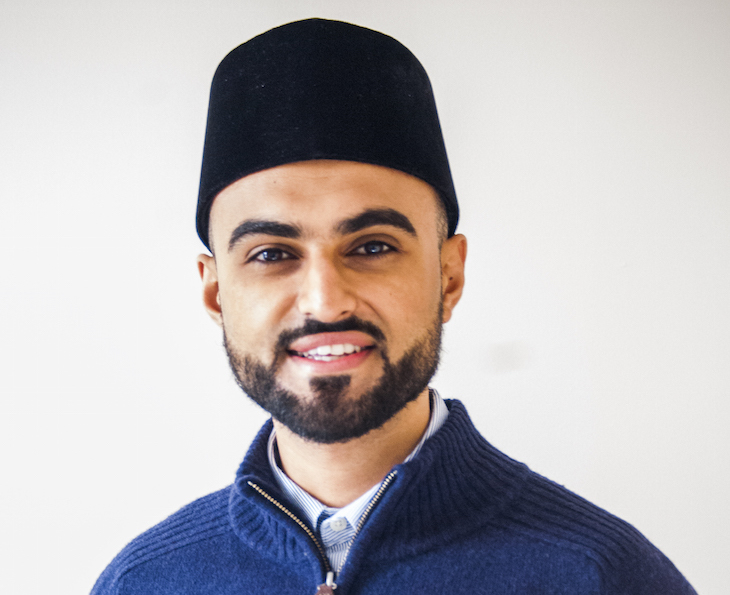
I am one of Britain’s youngest Imams. An Imam is a Muslim who has devoted his life to the service of Islam; my job means that I encourage people to do good, stay away from all that is immoral and serve humanity in every way possible.
I have seen this great city transition through many different phases, and observed the good as well as the ugly, from scenes such as the tragic July 2005 bombings to the jubilation of the 2012 Olympics. But what truly makes London a standalone city in the 21st century is the vibrancy and diversity it boasts like no other place. One can find people from all walks of life in this city. It is a melting pot of ethnicities, cultures and faiths; and it is for this reason that I am so proud to call myself a Londoner.

In recent years however, the mood seems to have become much more uneasy. Divisions across our country have resulted in record breaking cases of racism and xenophobia. According to the Home Office, religious hate crime has increased by 40% in the last two years. Statistics further show that a staggering 31% of the public believe that Islam poses a threat to the British way of life. Anti-Islamic sentiments are not typical of any particular group or section within society but rather range across the political spectrum.
Why is it that people hold such negative views about Islam? Often it's the perception that Islam is incompatible with freedom of speech. Some 41% of the British public believe that Islam poses a threat to their way of life because “Islam breeds intolerance…and calls for violent actions against those who depict the religion in ways they believe are offensive”. Another reason people are likely to fear Islam is the concern that Islam supposedly promotes discrimination and oppression against women.
This is something I have personally experienced. My wife Melissa and I were once travelling back on the tube from dinner in Kensington, with two middle-aged men sat opposite us. I began to notice that they were staring at us, talking and then shaking their heads. Bearing in mind Melissa, who converted to Islam when she was 14, was wearing a headscarf, I understandably felt uncomfortable and wondered what the issue was. I ignored them once, twice, but then when they did it the third time I had to question what they were so concerned about.

When I asked them they replied by saying that they weren’t looking at us rather at somebody else. But when I looked around it was only us in the carriage. To be honest I think they were shocked when I questioned them, because they hurried off at the next stop. I personally think that they were concerned by one of two things; either they were wondering why Melissa, a white British woman, had converted to Islam, or they thought she was being forced to wear a headscarf. Both were totally untrue.
What, then, is the solution? I believe that both Muslims and non-Muslims alike must play an active role in engaging in constructive dialogue about Islam. Muslims have a responsibility to promote the true and peaceful teachings of Islam. As a student of religion, it is my firm faith that Islam is indeed compatible with the modern world. It is an all-encompassing religion with incredible dynamism. Due to the views of a small minority of Muslims, Islam has received unfair negative coverage.
The concern that Islam seeks to curb freedom of speech is, in my view, unfounded. If we turn to classical Islamic tradition, we find a very different story. The respected Rabbi Sacks has observed that throughout history, the first concrete example of freedom of speech can be found in no place other than the works of medieval Islamic philosopher, Averroës. According to him,‘you should always cite the views of your opponents. Silencing them is an implicit admission of the weakness of your case.’ The idea which Averroës puts forward is simple; through trying to silence your opponent, you in fact weaken your own stance. Rather, we should trust in the inherent integrity and beauty of religion to be able to assert the truth independently. This is such a powerful argument — the idea that truth speaks for itself.
Additionally, if we turn to the Holy Qur’an, we find it states, "There is no compulsion in Religion". Clear evidence that Islam promotes the freedom of conscience. Everyone is free to choose his or her faith and no Muslim can lawfully impose upon a non-believer. Of course, there are ongoing debates as to what limits should be placed on freedom of speech, with the lines between free speech and hate speech often being blurry.

Regarding the case of women, I always find it unbelievable that people raise such an allegation against Islam. Studying Islam in its historical context, we find that it was the first religion to give women the right to inherit, to marry out of choice, divorce, work, own property independent of any male relative, seek protection of the law and to participate in civic and political society. In fact, one of the great scholars in the Islamic tradition is the wife of the Holy Prophet Muhammad (peace be upon him), Ayesha — who we proudly call the ‘Mother of the believers’.
We all must live together in this city. If we are to have any hope of preserving a positive future for our children something needs to be done. Brexit has shaken Britain’s position on the world stage. As much as it is a matter defining our relationship with the outside world, it is equally an event which has forced us to look within ourselves, redefine our identity and decide the type of community we want to become. It is my firm belief that through constructive and honest dialogue we will be able to challenge the difficulties which face us ahead.
Follow Sabah Ahmedi on Twitter.



